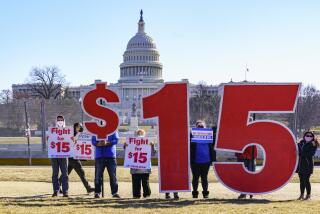Stamp Price to Rise, but Post Office Still Sinking
- Share via
WASHINGTON — The cost of a first-class stamp will rise to 37 cents this summer, a federal rate-setting agency ruled Friday, but the Postal Service is widely expected to spiral into deeper debt even with the added cash.
The 3-cent increase--the largest in a decade--was approved by the Postal Rate Commission after an unusual consultation among the post office, bulk mailers and unions that was itself seen as a sign of the urgency of the mail service’s financial problems.
The higher rates are expected to go into effect June 30. But they are expected to gain only “breathing room” for the postal service, said commission chairman George A. Omas, and perhaps a year of stable postal costs for businesses that rely on bulk mail service to reach far-flung customers.
The $70-billion entity with 900,000 employees and more than 38,000 local branches was hemorrhaging money even before last fall’s deadly anthrax cases. The attacks forced officials to spend more on safety and security. It also accelerated the post office’s most serious long-term dilemma: the failure of mail volume to grow fast enough to cover costs.
“Although [the Postal Service] is mandated to break even over time, it is not generating sufficient revenues to cover both its operating expenses and capital needs,” congressional auditors said in a report earlier this week. Its “financial outlook is becoming increasingly dire.”
The rate increase will not be enough for the post office to break even and may make things worse by creating an incentive for some bulk mailers to seek cheaper alternatives, the report said.
Along with the commission-approved increase in the price of first-class stamps, the cost of most other services will also rise. Postcards will go up by 2 cents, to 23 cents. Priority mail will go up 35 cents, to $3.85 per pound. The cost to utilities of mailing bills will rise 2.3 cents, and a bank statement will go up 3 cents. Money orders up to $500 will cost the same amount, 90 cents.
“The rate change is not going to solve the problem,” said Leslie Paige, a spokeswoman for Citizens Against Government Waste, which favors letting private entities compete with the post office. “It’s time for Congress to step up to the plate and reform the system.”
Postal service spokesman Mark Saunders said the agency is preparing a reorganization plan for Congress, to be issued next month.
Congress considered various reforms during the 1990s but failed to pass any, a testament to thorny politics that involve powerful postal unions and business lobbies. The stakes are huge: The mailing industry employs an estimated 9 million people and accounts for 8% of the nation’s gross domestic product. Lawmakers are reluctant to jump into the fray.
“The goal is for [Postal Service officials] to work this out on their own and change their business plan,” said a congressional aide to a lawmaker involved in the debate. “They are so far behind the eight ball that this rate increase isn’t going to make that much of a difference in covering their deficit. They had filed for this before the anthrax cases.”
The Postal Service deficit jumped more than eightfold from 2000 to 2001, rising to $1.68 billion from $199 million. Even before the anthrax cases, the post office was projecting a $1.35-billion deficit for 2002. It subsequently asked Congress for more than $5 billion to cover cleanup costs and safeguards against contamination.
Only $675 million has been set aside. The Postal Service covers its deficits by borrowing from the U.S. Treasury, a debt that now exceeds $11 billion.
“At this point, I don’t think anybody has a good handle on how bad things are,” said Postal Rate Commission spokesman Steve Sharfman.
The American Postal Workers Union, which represents workers who sort mail, was a notable exception to the consensus. The union objects to discounts offered to large mailers as an inducement to keep them using the system, saying the discounts come at the expense of the general public.
More to Read
Sign up for Essential California
The most important California stories and recommendations in your inbox every morning.
You may occasionally receive promotional content from the Los Angeles Times.













